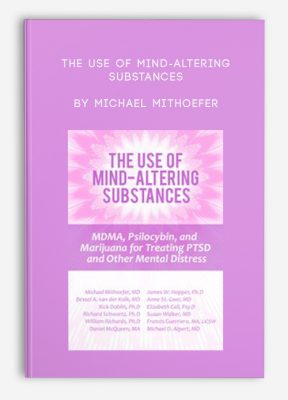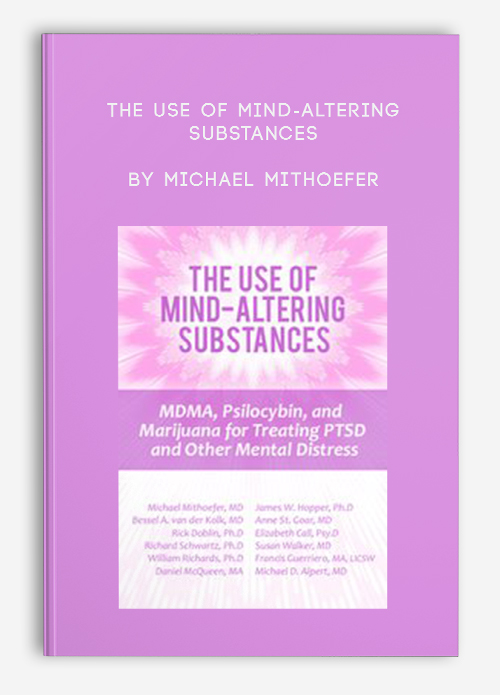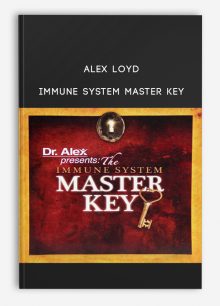The Use of Mind-Altering Substances by Michael Mithoefer
$109.00 $32.00

The Use of Mind-Altering Substances MDMA, Psilocybin, and Marijuana for Treating PTSD and Other Mental Distress by Michael Mithoefer, Bessel Van der Kolk , Richard C. Schwartz , Rick Doblin , William Richards , Daniel McQueen , James W. Hopper , Anne St. Goar , Elizabeth Call , Susan Walker , Francis Guerriero, Michael Alpert
Faculty:Michael Mithoefer | Bessel Van der Kolk | Richard C. Schwartz | William Richards | Daniel McQueen | James W. Hopper | Anne St. Goar | Elizabeth Call | Francis Guerriero | Michael Alpert | Phil Wolfson
Duration:6 Hours 28 Minutes | Format:Audio and Video
Archive : The Use of Mind-Altering Substances by Michael Mithoefer
Get The Use of Mind-Altering Substances by Michael Mithoefer on Salaedu.com
Outline:
Introduction
MDMA
- History of MDMA
- Pharmacology of MDMA
- Controlled Clinical Trials since Scheduling
- Therapeutic Method Used in Clinical Trials
Psilocybin
- Languages and Cognitive Frameworks for Discussing Psychedelics
- History of Psilocybin
- Recent Clinical Research with Psilocybin
- Therapeutic Method Used in Clinical Trials
Ketamine
- General Practices of Ketamine Assisted Psychotherapy
- Recent Clinical Research with Ketamine
- History of Ketamine
- The Psychedelic Toolbox
Cannabis
- Cannabis Overview
- Current Cannabis Research
- Cannabis Assisted Psychedelic Therapy
- Case Study and Conclusion
- Need for Further Research
Discussion on the Integration of Psychedelic-Assisted Therapy
Q&A Panel with Presenters
Q&A Panel with MAPS MDMA Therapy Team
Get The Use of Mind-Altering Substances by Michael Mithoefer on Salaedu.com
Description:
For the first time in over four decades, researchers are returning to examining the therapeutic benefits of mind altering substances, including MDMA (ecstasy), psilocybin (mushrooms), marijuana and LSD.
In the 1970s the study of all psychedelics was criminalized in the US, despite emerging evidence of their medical value. Over the past decade, the Multidisciplinary Association for Psychedelic Research (MAPS) has helped to revive psychedelic research, sponsoring studies across the United States and around the world, including MDMA-assisted therapy for PTSD, and end-of-life anxiety. The results have been very positive, lasting over 72 months of follow-up, with few adverse effects.
Psychedelics may promote a deepening and acceleration of the psychotherapeutic process. During therapy, people often are able to access and find peace with disavowed, “exiled” parts of themselves.
In this workshop recording the founder of MAPS will describe the evolution of psychedelic therapy, the principal investigator of the Phase I and II level trials will discuss outcomes and processes, the PI of the Hopkins psilocybin study terminally ill patients and a marijuana researcher the promises and pitfalls for that substance. The Boston MDMA study team will discuss clinical experiences and applications.
In appropriate therapeutic contexts, psychedelics may prove to be more effective than most conventional treatments, as well as safer and more cost-effective.
Objectives:
- Discuss the emerging research of MDMA-Assisted Psychotherapy (MDMA-AP) and describe effective ways of integrating it into ongoing psychotherapy to improve clinical outcomes for clients with PTSD.
- Examine the history and contemporary research of Psilocybin and evaluate the effectiveness of Psilocybin-Assisted Psychotherapy (PAP) in facilitating psychotherapy.
- Communicate the ongoing work with Ketamine-Assisted Psychotherapy (KAP) and synthesize methods of integration of psychedelic-assisted therapy in contemporary treatment for mental illness.
- Distinguish different types of Cannabis and ways that it can be used in psychotherapy, including Psychedelic Cannabis-Assisted Psychotherapy (CAP), and summarize current research on Cannabis Sativa and its variations.
- Consider the similarities and differences between each of the psychedelic drugs, and evaluate the potential for integration with modern psychotherapy.
- Consider the advantages, risks, and adverse effects of psychedelic drugs and support the possibilities for future research.
1 review for The Use of Mind-Altering Substances by Michael Mithoefer
Add a review Cancel reply
Related products
HEALTH - FITNESS - LIFESTYLE - MEDICAL
HEALTH - FITNESS - LIFESTYLE - MEDICAL
HEALTH - FITNESS - LIFESTYLE - MEDICAL
HEALTH - FITNESS - LIFESTYLE - MEDICAL
Complete Certified Professional Coach Online Course from Berry Fowler
HEALTH - FITNESS - LIFESTYLE - MEDICAL
HEALTH - FITNESS - LIFESTYLE - MEDICAL
HEALTH - FITNESS - LIFESTYLE - MEDICAL
HEALTH - FITNESS - LIFESTYLE - MEDICAL










king –
“We encourage customers to contact Customer Service and think twice before making payment. All course contents will be similar to what is from the author.”
Thank you!